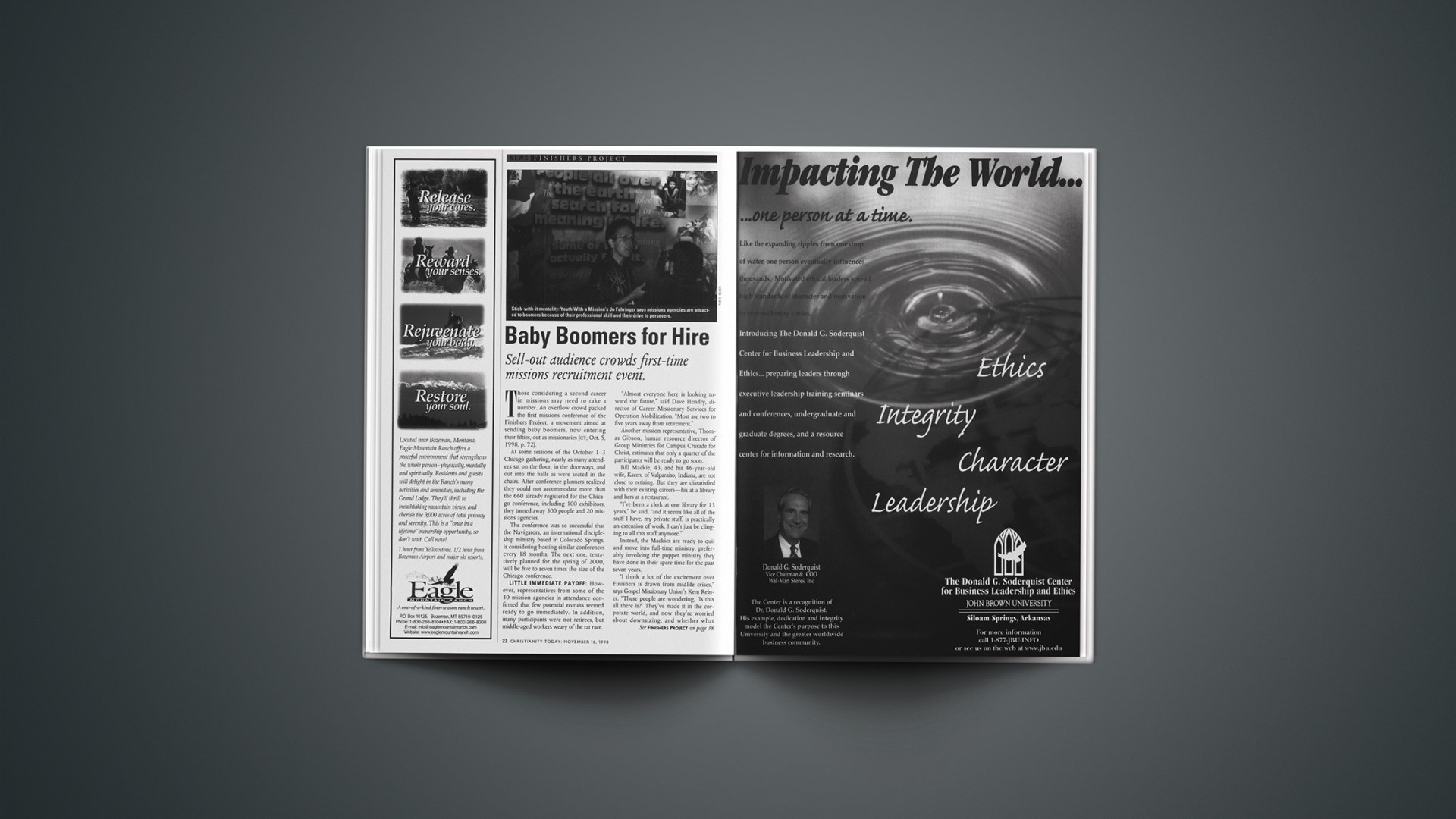Those considering a second career in missions may need to take a number. An overflow crowd packed the first missions conference of the Finishers Project, a movement aimed at sending baby boomers, now entering their fifties, out as missionaries (CT, Oct. 5, 1998, p. 72).
At some sessions of the October 1-3 Chicago gathering, nearly as many attendees sat on the floor, in the doorways, and out into the halls as were seated in the chairs. After conference planners realized they could not accommodate more than the 660 already registered for the Chicago conference, including 100 exhibitors, they turned away 300 people and 20 missions agencies.
The conference was so successful that the Navigators, an international discipleship ministry based in Colorado Springs, is considering hosting similar conferences every 18 months. The next one, tentatively planned for the spring of 2000, will be five to seven times the size of the Chicago conference.
LITTLE IMMEDIATE PAYOFF: However, representatives from some of the 30 mission agencies in attendance confirmed that few potential recruits seemed ready to go immediately. In addition, many participants were not retirees, but middle-aged workers weary of the rat race.
"Almost everyone here is looking toward the future," said Dave Hendry, director of Career Missionary Services for Operation Mobilization. "Most are two to five years away from retirement."
Another mission representative, Thomas Gibson, human resource director of Group Ministries for Campus Crusade for Christ, estimates that only a quarter of the participants will be ready to go soon.
Bill Mackie, 43, and his 46-year-old wife, Karen, of Valparaiso, Indiana, are not close to retiring. But they are dissatisfied with their existing careers—his at a library and hers at a restaurant.
"I've been a clerk at one library for 13 years," he said, "and it seems like all of the stuff I have, my private stuff, is practically an extension of work. I can't just be clinging to all this stuff anymore."
Instead, the Mackies are ready to quit and move into full-time ministry, preferably involving the puppet ministry they have done in their spare time for the past seven years.
"I think a lot of the excitement over Finishers is drawn from midlife crises," says Gospel Missionary Union's Kent Reiner. "These people are wondering, 'Is this all there is?' They've made it in the corporate world, and now they're worried about downsizing, and whether what they've done has significance and meaning."
Nelson Malwitz, founder and chair of the Finishers Project, does not believe attendees are motivated by a midlife crisis. "It's a demographic phenomenon where you say, 'I've done what I've done. Now what?' "
While some Finishers may be looking at missions more to bring meaning into their lives than because of an interest in the lost, Malwitz is not concerned. "We're not questioning their motivation right now," he says. "Our calling is to give them the opportunity and challenge."
OPPORTUNE TIME: Because changing careers can take several years, Malwitz is glad most attendees were in their forties. "If it hits at 55, they won't be ready," he says. "At 42, you can build relationships, go on short-term missions, and prepare."
Such thinking is relatively new. Ron Linkenback, 49, and wife, Jan, 48, tried to go a few years ago. "Mission boards didn't know what to do with us. It seemed like mission boards wouldn't even consider you if you're over 35," says Jan Linkenback. "At this conference, we've been overwhelmed. There's an army ready to be recruited here."
As with the Mackies, who say they do not have much of a nest egg in place, the Linkenbacks are not waiting for their 401(k) to kick in. "Early retirement is kind of a cop-out," says Jan Linkenback. "I don't think it's really relying on the Lord to use his resources."
Ron Linkenback just changed jobs, and they are in the middle of a move from Cleveland to Springfield, Illinois. Still, they are ready to begin full-time ministry as soon as they can. "If God wants us to go, we'll go," Jan Linkenback says.
As with the Linkenbacks, many of the conferees have had previous overseas missions experiences. By attending this meeting, most sought more than the two-week blitzes they had typically experienced in the past.
SHORT-TERM PREFERENCE: Still, mission agencies exhibiting at the conference are not counting on the years-upon-years of service the boomers have given to their careers.
"There are two crucial factors at work here: aging parents and grandkids," says Roger Shriner, director of recruitment for OMS International. "I'd estimate that about 75 percent of the people here are going to have to orient themselves around those bookends." As a result, he says, OMS and other mission agencies are hoping to recruit Finishers only for a year or two.
"But that's not new," he says. "Most missionaries today are short-term, and then they generally repeat. But even if they don't, they're better prayer warriors. They give more to missions. They're more holistically 'world Christians,' and the experience has made them new persons."
Copyright © 1998 Christianity Today. Click for reprint information.










